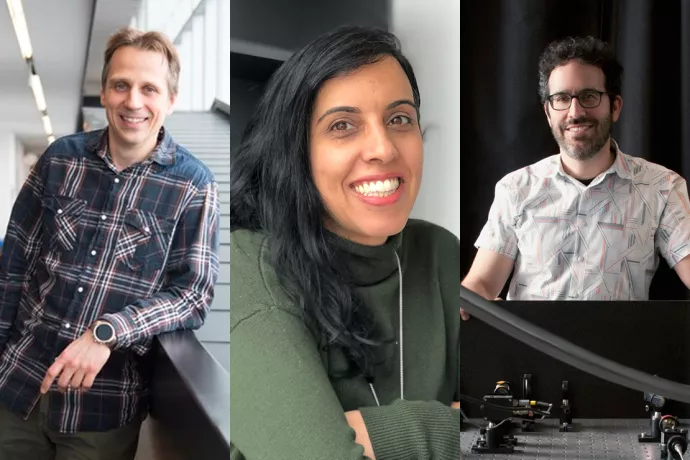
UTM researchers receive funding to combat Tuberculosis and preserve migrant stories
U of T Mississauga researchers are teaming up with colleagues in other disciplines to tap into their unique expertise and work collectively on research designed to push boundaries. From seeking new ways to combat Tuberculosis to creating mechanisms for migrants to preserve their stories, two interdisciplinary research teams have received funding to tackle projects that have the potential to make a significant impact.
Battling TB
Professor Joshua Milstein, who was awarded $250,000 from the New Frontiers in Research Fund (NFRF), will focus on combatting bacterial persistence in Tuberculosis (TB), a contagious infection that is one of the top 10 causes of death worldwide.
“Over the years my lab has primarily focused on the molecular mechanisms of chronic infection and antibiotic resistance to study how harmless bacteria might suddenly turn on some genetic switch and either become deadly or morph into an infectious state,” says Milstein, who is collaborating with fellow U of T professors Jon Rocheleau from the Institute of Biomedical Engineering and Jun Liu in molecular genetics.
“We are aiming to better understand the metabolic changes that occur in ‘persister’ cells associated with TB in the hope of making the treatment of this infection more effective and, perhaps, one day eradicating TB entirely.”
An infection of the lungs, TB is typically treated with an antibiotic cocktail for up to six months, Milstein explains. The antibiotics might kill some of the bacteria, but he says that persister cells, which are a “subpopulation” of the infectious cells, are able to slow their growth and activity, allowing them to survive. After treatment, they can switch on, bringing the infection back with them.
Milstein’s lab will study M. smegmatis cells, a non-infectious relative of the TB pathogen, and determine how changes in their metabolism help them survive. Rocheleau’s team will create genetically encoded biosensors that make individual cells glow, allowing Milstein’s lab to track and study metabolic changes inside the bacteria using computer software. Liu brings his extensive expertise of TB to the project to help them better understand elements of the disease.
“TB is the canonical example where cells use this survival strategy, and so understanding and combatting the persister cells in this infection is ultimately the key,” says Milstein. “If you can figure out what genes are turning on that make them go into this inert metabolic state, maybe there are ways then to target this strange persister-cell population specifically so that the person suffering from TB will eventually be spared from taking these huge and extended regimes of antibiotics.”
Preserving cultural storytelling
Professors Cosmin Munteanu and Negin Dahya in UTM’s Institute of Communication, Culture, Information and Technology (ICCIT) were also awarded a NFRF grant, receiving over $247,000 for their project, which examines the preservation of culture through storytelling within displaced populations.
“Cultural identity and resilience are often preserved across generations through social practices, such as grandparents telling stories and imparting cultural knowledge to their grandchildren,” says Munteanu.
“However, these practices are disrupted during crisis or economic migration and resettlement,” adds Dahya.
“This upheaval can, in turn, create significant barriers for older generations who help shape a sense of identity for younger family members, while at the same time they themselves are adapting to a new culture and facing challenges.”
While there are currently some supports in place, including digital tools to record stories, to help preserve this kind of cultural activity, they are often imbued with colonial values and compromised by technical limitations.
Munteanu, Dahya and their team, which also includes Assistant Professor Ishtiaque Ahmed from U of T’s Department of Computer Science, aim to better understand how cultural resilience is reinforced through storytelling and more closely examine the lack of support during and after migration. The team expects to define strategies to help migrants develop and establish their cultural identity.
“With Negin’s expertise in critical feminist theory, digital media production and migration, Ishtiaque’s work in computing technology and marginalized population, and my own research in human-computer interaction and cross-generational connections, we expect our findings to make significant scholarly impact and social contributions,” says Munteanu.
See the full list of recipients from the 2019 competition, visit the NFRF website.
